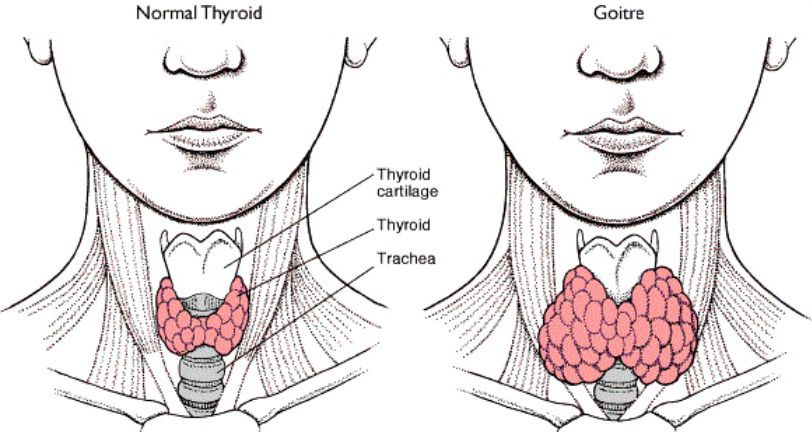What is Goiter?
An enlargement of the thyroid gland, located in the lower front part of the neck around the windpipe, is called “goiter.” It is especially common in people with iodine deficiency and has a high prevalence in Turkey. Looking at the gender distribution, women are at five times greater risk than men.

Causes of Goiter
The main causes of goiter disease include the following:
- Iodine deficiency
- Graves' disease
- Inflammatory thyroid diseases like Hashimoto's disease
What are the types of Goiter?
Goiter can be classified in several ways, based on the pattern of growth and thyroid hormone levels. The types of goiter classified according to growth are as follows:
Simple (Diffuse) Goiter
This type of goiter involves a complete enlargement of the thyroid gland without nodules. Causes include iodine deficiency, Hashimoto's disease, and Graves' disease.
Nodular Goiter
Nodular goiter involves the presence of nodules and enlargement of the thyroid gland. It can present as a single nodule or multiple nodules. If there are multiple nodules, it is termed a multinodular goiter.
Goiter types classified according to thyroid hormone levels are as follows:
- Toxic Goiter: This goiter occurs when your thyroid is enlarged and produces an excess amount of thyroid hormone. The cause here can be overly active nodules (hot nodules) or an overly active thyroid gland.
- Nontoxic Goiter: If your thyroid is enlarged but your thyroid levels are normal (euthyroid), this is called a nontoxic goiter.

What are the symptoms of Goiter?
- A lump appearance in the front of your neck
- A feeling of tightness in the throat area
- Hoarse voice
- Swelling of the neck vein
- Difficulty in breathing (shortness of breath)
- Coughing
How is Goiter Treated? Antalya
Goiter treatment is based on the causes of the thyroid gland enlargement. Therefore, the diagnosis and treatment of the disease are of great importance. In Antalya Muratpaşa, goiter diagnosis and treatment are meticulously conducted by Interventional Radiology Specialist Assoc. Prof. Dr. Bülent Çekiç. For detailed information and to make an appointment, please contact us.
The goiter treatment methods we apply include the following:
Medical Treatment
In Simple Goiter (Diffuse Goiter), treatment is targeted to the underlying cause.
If there is iodine deficiency — Iodine replacement therapy is applied.
If it is Hashimoto's thyroiditis — Thyroid replacement therapy is applied.
If it is Graves' Disease — Antithyroid medications are given to suppress thyroid hormone production.
Radioactive Iodine Treatment
RAI is administered orally with a radioactive iodine (I-131) molecule. In this treatment, radioactive iodine molecules enter the thyroid cells and destroy them.
However, the most significant side effect of this treatment is the development of permanent hypothyroidism due to the destruction of the thyroid gland by radioactive iodine molecules. As a result, the patient must receive lifelong thyroid hormone replacement therapy.
In addition, it has been reported to have adverse effects on fertility in younger patients.
Surgical Treatment
In surgical treatment, the entire thyroid gland is removed, leading to permanent hypothyroidism, and the patient will need lifelong thyroid hormone replacement therapy. In addition, complications such as neck incision scars, hypoparathyroidism due to the removal of the parathyroid glands, and potential complications from general anesthesia may occur.
Thyroid Ablation and Embolization Treatments
The effectiveness of Thyroid artery embolization is high in Simple (Diffuse) Goiter and Multinodular Goiter. In this method, three or all four feeding arteries of the thyroid gland are blocked by injecting small particles called embolic agents via a thin needle into the femoral artery in the groin. The thyroid gland shrinks to its normal size within 1-2 months without losing its function.
If the thyroid gland is overactive, it eliminates the need for antithyroid medications in 80% of patients with Non-Graves Hyperthyroidism. Many Graves' patients are required to use high doses of antithyroid medications. Often, unwanted side effects develop in many patients due to high-dose antithyroid medication use. When thyroid artery embolization treatment is applied in Graves' patients, the required dose of antithyroid medication can be reduced by 80%, protecting the patient from medication-related side effects.
Advantages of Thyroid Artery Embolization
The procedure is performed under local anesthesia, and the patient can return to normal life 6 hours after the procedure.
There is no incision scar on the patient's neck.
The patient does not lose the thyroid gland, does not develop hypothyroidism, and does not require lifelong thyroid hormone replacement therapy.
After the embolization procedure, the thyroid gland shrinks by an average of 70-80% within three months.
If the patient has one or two nodules that cause an increase in the size of the thyroid gland, percutaneous thermal ablation treatment can be applied (Radiofrequency, Microwave). In this treatment, a thin needle is inserted into the thyroid nodule through the skin of the neck, and it is destroyed by heat. The thyroid nodule loses its vitality immediately after the ablation procedure and shrinks by 80% within three months.
In some patients, both treatment methods can be applied together (Thyroid artery embolization and percutaneous thyroid ablation). This usually depends on the number of existing nodules and the size of the thyroid gland.
Advantages of Percutaneous Thyroid Nodule Ablation (Radiofrequency, Microwave)
Radiofrequency ablation and microwave ablation have the following advantages in terms of treatment:
- It is a non-surgical treatment method.
- It is performed under local anesthesia.
- There is no scar on the neck.
- The risk of complications is extremely low compared to surgery.
- The treatment is completed in 30-60 minutes on average.
Antalya Goiter Treatment
Assoc. Prof. Dr. Bülent Çekiç performs goiter and thyroid nodule treatments in Antalya with percutaneous thyroid nodule ablation and thyroid artery embolization methods. You can get detailed information and make an appointment by contacting us.

 TR
TR

